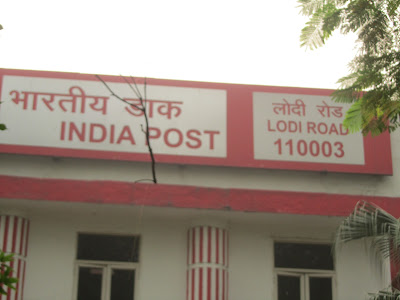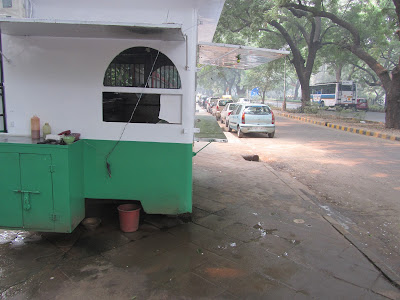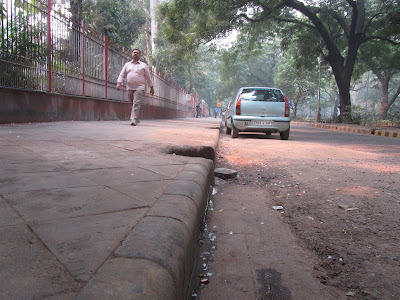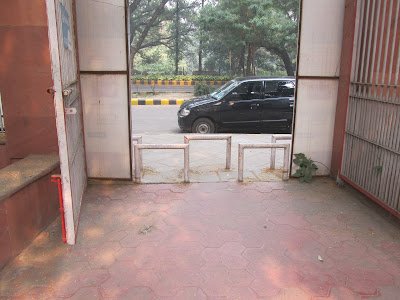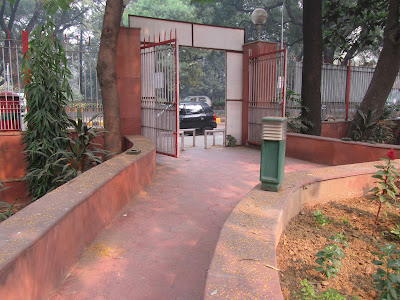Our entire education system, even the special schools /infrastructure created for the hearing impaired (barring few exceptions) is unwelcoming and inaccessible to the deaf children. Need of interpreters at public places is one demand from the sector to make the environment accessible for the hearing and speech impaired. However, the effort of mainstreaming or of providing interpreters will not bring the desired result if the root cause is not targeted.
The education system in the Government Schools for the Deaf is unscientific and results in only 2-3% pass percentage at matriculation level in a state like Delhi. I personally know this since I have seen several deaf young adults re-attempting the matriculation exam time and again to get those 33% but with rot learning and remembering the paragraph visually will not lead to formation of correct sentences. Majority of deaf children who have passed 10th from the Government deaf schools can not write a full paragraph of their own which is grammatically correct - in any language - be it Hindi or English. Is this what we are aspiring for?
The whole education system for the deaf needs an overhaul with sign language also getting its due place in the overall education system. The teachers and supporting staff do not know sign language. So much so, the deaf person remain alienated in their own families since there is hardly any effort or facility to train the family members in sign language. A deaf person always prefers to marry another deaf person indicates the level of their alienation from the mainstream society.
Unless we did something to remove this alienation due to lack of communication with the deaf children / persons in various walks of life - be it education, employment or social inclusion, the deaf will continue to suffer and government will continue to help them become handicapped and excluded.
The report below from UP reveals the ground realities being faced by people.
TNN | Nov 14, 2012, 01.28 AM IST
LUCKNOW: As a child Vijendra, 28-year-old always wanted to be a gazetted officer. Though deaf and mute, he overcame disability with his sheer willpower and hard work, and cleared the examinations with good grades. However, the pathetic state of affairs in the two government schools meant for hearing-impaired children (in Agra and Gorakhpur till class 10thh forced Vijendra to take admission in a regular school in class ninth, which neither had trained teachers nor facilities needed to meet the special needs of the children like him. As a result, he failed twice to clear class 10th examination, lost his confidence and saw his dreams virtually crashing. Vijendra had no other option, but to leave studies and take up job for the sake of his family. Today, Vijendra works as a helper in an outlet of a retail giant. His job is to bring back the trolley left by people at parking and for this he gets Rs 3,500 per month.
"There are many like me, who want to do something big in life but cannot because there are no schools for us," said Vijendra while narrating the difficulties he underwent in a regular school. Similar is the case of Sanjay Singh, who is working at an outlet of a retail giant.
As per official estimates, there are around three million deaf children in India and around 25,000 such children take birth every year. According to disabled welfare department, the population of deaf and mute people in the state is about eight lakh including around 4,80,000 deaf children. In the absence of a special school, around 50% students with hearing impairment drop out after basic education in India every year. The situation in UP is said to be worse. According to a study conducted by Kaushalendra Kumar, a teacher at NC Chaturvedi School for Deaf, the drop out rate of deaf and mute students after class eighth in UP is 95%. "For deaf children, normal school is like a river in which they get drowned, as they do not know how to cross it," said Kumar.
Even if a deaf and mute student is able to clear the school level, there are no facilities for them in the higher education. Take the example of Faizal (22) who managed to clear class 10th and 12th from a normal school, but found that there is no college with facilities for hearing impaired in higher education. There is a university for disabled - UP Viklang Uddhar Dr Shakuntala Mishra Rehabilitation University, but it does not have facilities for hearing impaired. Faizal took admission in BA, but found that the teachers at the university teach orally and do not use the sign language for hearing impaired or an interpreter. "As I am deaf by birth, I cannot speak and hence there is no communication between me and the teacher," said a visibly angry Faizal whose repeated request to provide an interpreter fell on the deaf ears of the university authorities.
Not only education, there are no facilities for the hearing impaired as far as sports is concerned. Raj Kumar (23) left school after class eighth. But he is a good cricket player and was selected as an all-rounder North Zone in 2010. But after that, as there was no coaching or resources available for him, he did not qualify for any other cricket match. Now he is searching for job for livelihood. Earlier, the youth and sports department of the state used to give a grant of Rs two lakh per annum for sports activities of deaf children. However, the grant was discontinued in 2004 on grounds that it has funds only to support 'normal' sportspersons. When the deaf sportsperson went to the disabled welfare department with the request, they were sent back to sports department. They are running from pillar to post since then.
Significantly, there are number of hearing impaired sportsperson in UP who have done well at the national and international level. Asif Ayubi has won several medals at the state and national levels in 10,000 metre race and stood fourth in Melbourne Deaflympics in 2005. Vikram Singh, brought laurels to the country by winning a bronze medal in the 3rd Asia Pacific International Badminton championship. However, their career in sports was cut short after the sports department stopped the grant. "Many think that the sports and extra-curricular activities for the disabled are useless, but the fact is that it helps in breaking the communication barriers and improves self-confidence. Many deaf children have excelled in life after improvement in their communication abilities," said Rajeev Kumar Sharma, general secretary, Uttar Pradesh Sports Council for Deaf.
Sharma is himself a deaf person and is an example for others to follow. Hailing from a poor family, Sharma's parents did not spend on his education. But they educated his younger brother who was not disabled. To support his studies, Sharma sold water, watches and toys at Kaiserbagh bus stand for many years. In the morning, he used to go to school and also used to take typing classes, while in the noon and evening, he used to sell such items. He passed class eighth from NC Chaturvedi School For Deaf and class 10{+t}{+h} from a regular school in the year 1988. He got the job of typist in the Army in 1992. At presently, he is the office superintendent.
While talking to TOI, principal secretary, handicap welfare department, VN Garg said that there is need to add more schools for deaf children because two schools till class 10{+t}{+h} in the state are not enough for a large number of students. "But we face problem of shortage of funds and trained teachers. The average per capita expenses incurred on a disabled child's education is three times higher than a normal child. Apart from infrastructure, we need to provide all kind of incentives to disabled students," said Garg.
Commenting on the need of an interpreter for students with hearing disabilities, registrar, UP Viklang Uddhar Dr Shakuntala Mishra Rehabilitation University, SK Srivastava said, "We are aware about the problem and we will appoint the interpreters when we will find them, as there is scarcity of such teachers in the market." He added that the students are not facing difficulties in the studies, as they can understand what is written on blackboard or projector. All of them have passed class XII without the help of an interpreter.
